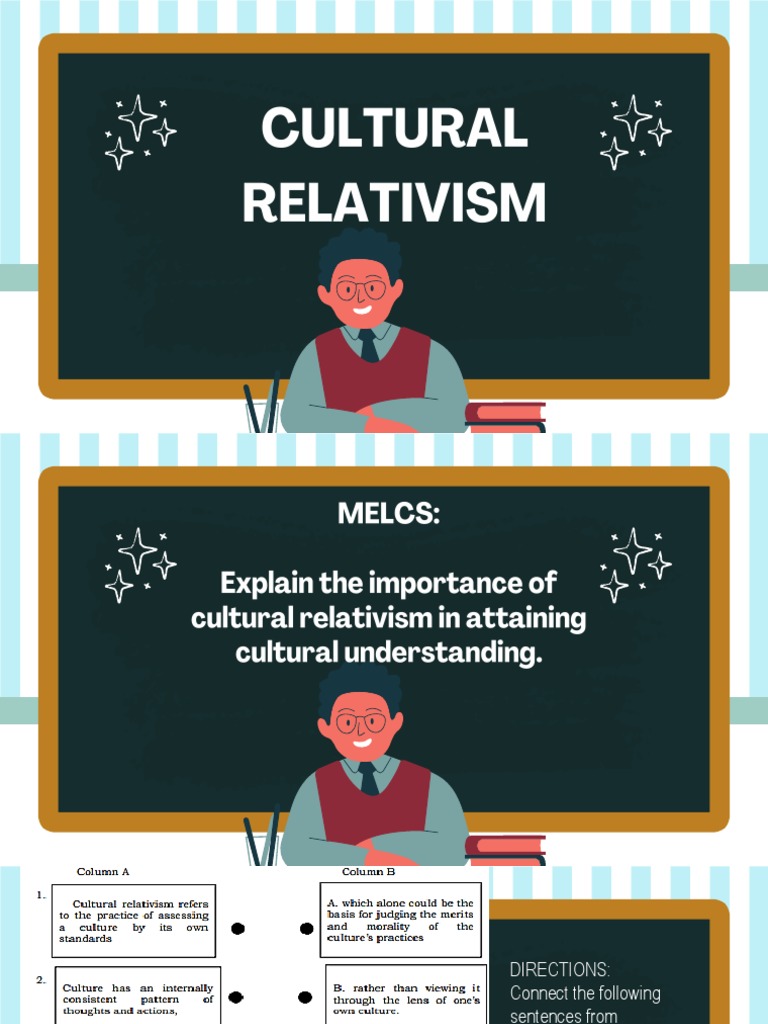Cultural relativism is a theoretical framework asserting that a person’s beliefs and practices should be understood based on that person’s culture, rather than be judged against the criteria of another culture. While this perspective ostensibly fosters tolerance and understanding, it also engenders a multitude of problematic implications that merit critical examination. This discourse seeks to elucidate why cultural relativism may be fundamentally flawed and the consequences it bears on moral discourse, social justice, and global issues such as climate change.
At its core, cultural relativism posits that all cultural beliefs are equally valid. This egalitarian stance is seductive, as it promotes a notion of respect for diversity. However, such an outlook can lead to moral paralysis. If one adheres strictly to the tenets of cultural relativism, one might contend that practices such as human rights violations, gender discrimination, or even environmental degradation should be tolerated if they are culturally endorsed. This creates a moral quagmire where ethical standards become malleable, contingent upon cultural context. In effect, it undermines a universal framework of ethics — one that might advocate for the preservation of human rights and the environment.
The fallacies of cultural relativism extend into the realm of social justice. Consider the plight of marginalized groups who are often victims of oppressive cultural practices. For example, female genital mutilation (FGM) is frequently justified within certain cultures as a rite of passage or a tradition. A dogmatic adherence to cultural relativism may inhibit the global community from intervening or advocating against such practices, creating an ethical dilemma. The refusal to condemn harmful practices in the name of cultural sensitivity perpetuates systemic inequality and allows cultural norms to override fundamental human rights.
Furthermore, cultural relativism fails to address the dynamism inherent in cultures. Cultures are not static entities; they evolve, amalgamate, and sometimes clash with one another. As global interconnectedness intensifies, cultural exchange leads to the assimilation of new ideas and practices. A position that rigidly categorizes cultural phenomena risks overlooking the importance of this transformative nature of societies. By rigidly defining cultural practices as unassailable, cultural relativism stifles innovation and adaptation that are vital in addressing contemporary issues—including those posed by climate change.
In the context of environmental advocacy, cultural relativism proves particularly problematic. The planet faces existential threats that transcend cultural boundaries. Climate change, biodiversity loss, and environmental degradation are ubiquitous challenges that necessitate a shared response. Cultural relativism, when applied to environmental ethics, may trivialize the urgent need for collective action by insisting that all cultural perspectives bear equal weight in discussions about sustainable practices. Such a stance can hinder progress toward agreements needed to combat climate change, evading accountability for environmentally detrimental behaviors sanctioned by certain cultures.
In juxtaposition to cultural relativism, an alternative paradigm emerges: intercultural dialogue. This approach maintains that while it is critical to respect diverse cultural practices, there are universal values—such as sustainability and human rights—that should be upheld across cultures. Intercultural dialogue advocates for a critical yet respectful exchange of ideas where differing cultural perspectives can coexist while also engaging in the pursuit of shared values and responsibilities. By fostering open discourse, societies can collaboratively develop solutions to pressing issues while still honoring cultural diversity.
The dangers of blind cultural relativism can also be observed in attitudes toward science and technological progress. A stringent commitment to cultural norms may result in the dismissal of scientific insights that do not align with entrenched beliefs. For instance, some cultures might reject climate science due to traditional worldviews or religious interpretations. This form of cultural defense, while understandable within its specific context, can have dire ramifications on global efforts to address climate change. Every culture must embrace scientific literacy and empirical evidence to formulate effective responses to environmental challenges.
Moreover, cultural relativism can manifest in policy-making processes. Policymakers influenced by this worldview may hesitate to enforce regulations that challenge cultural practices, potentially undermining environmental protections. For instance, countries that prioritize economic growth over conservation might resist adopting international environmental agreements, citing cultural sovereignty. By granting cultural practices undue immunity from scrutiny, cultural relativism can perpetuate harmful practices under the guise of preservation, while ecology suffers the consequences.
In summary, cultural relativism presents a conflicting narrative that calls for a balanced assessment of cultural practices against a backdrop of universal ethics. While it aims to foster understanding and tolerance, its implications can inadvertently sanction harmful practices and hinder progress on critical issues such as climate change and social justice. As the global community grapples with these monumental challenges, it becomes imperative to champion a discourse that marries cultural respect with a commitment to universal values. Only through robust intercultural dialogue can we hope to cultivate an equitable and sustainable future for all.
